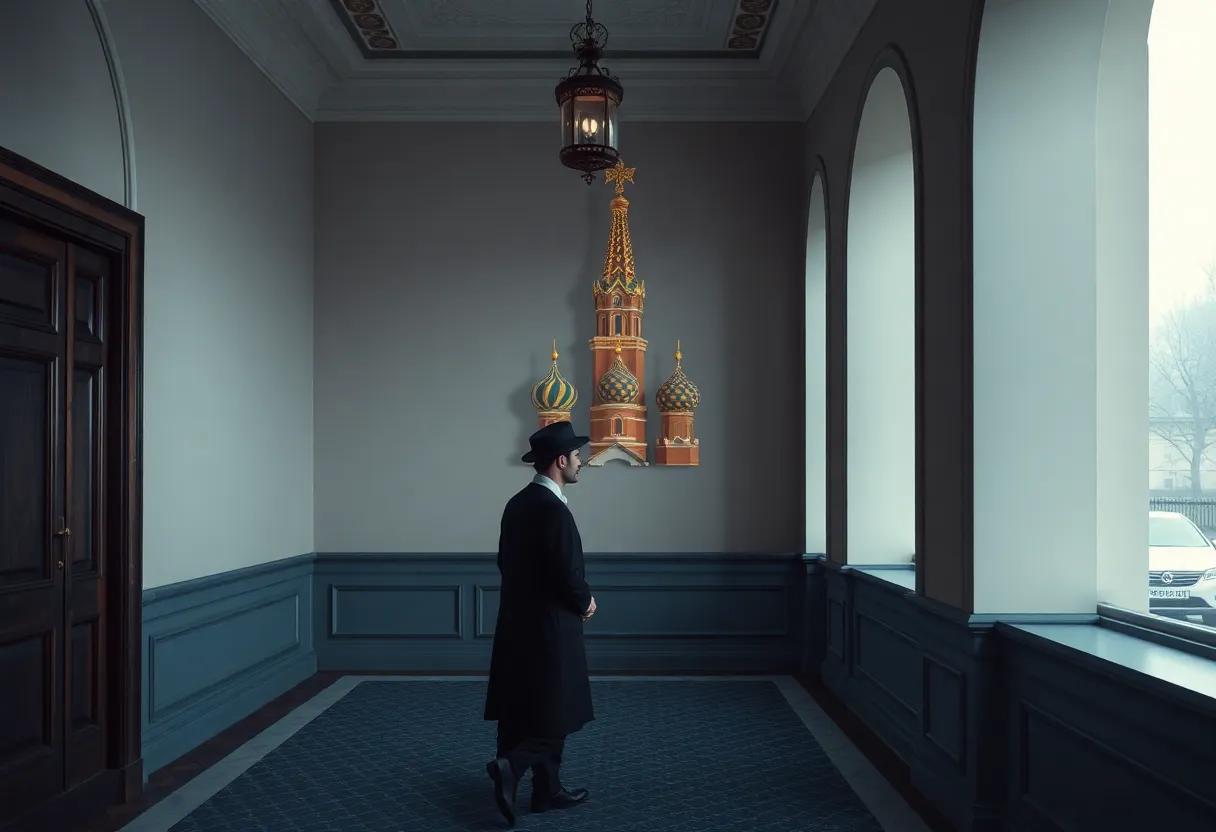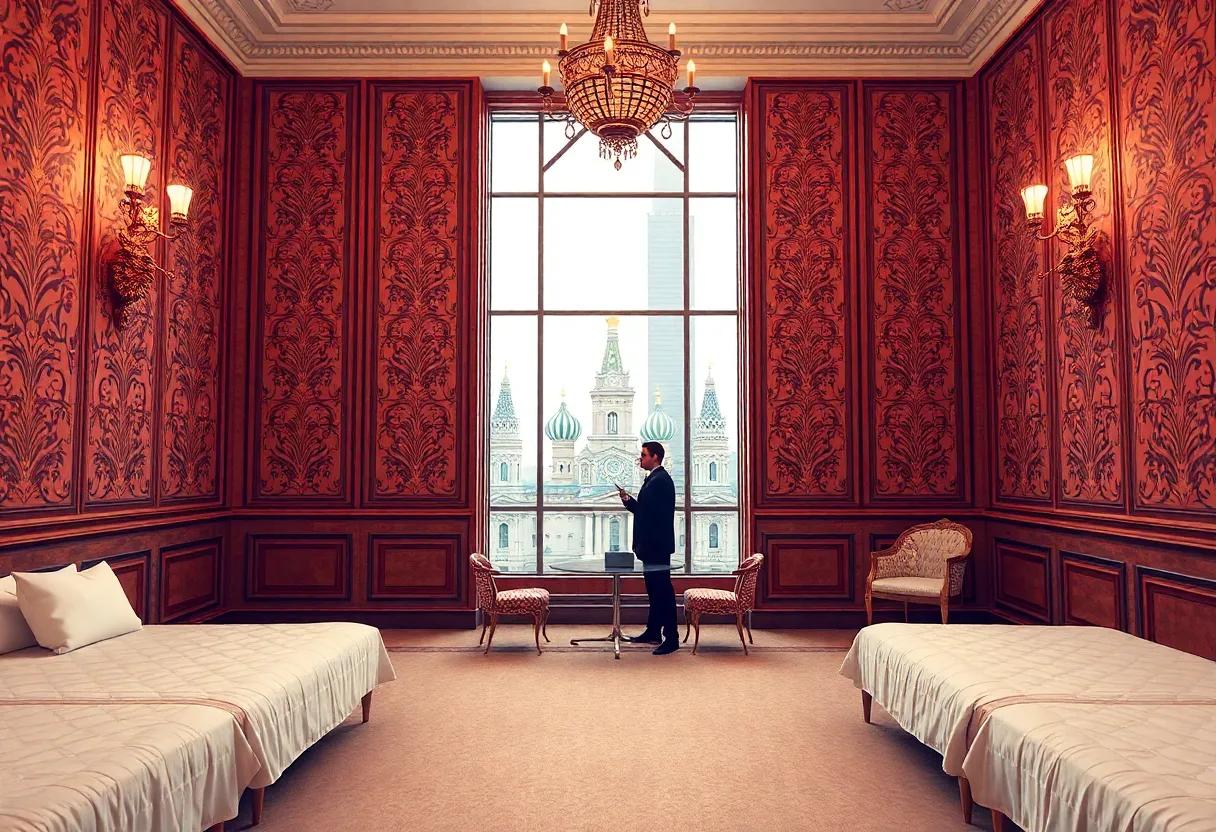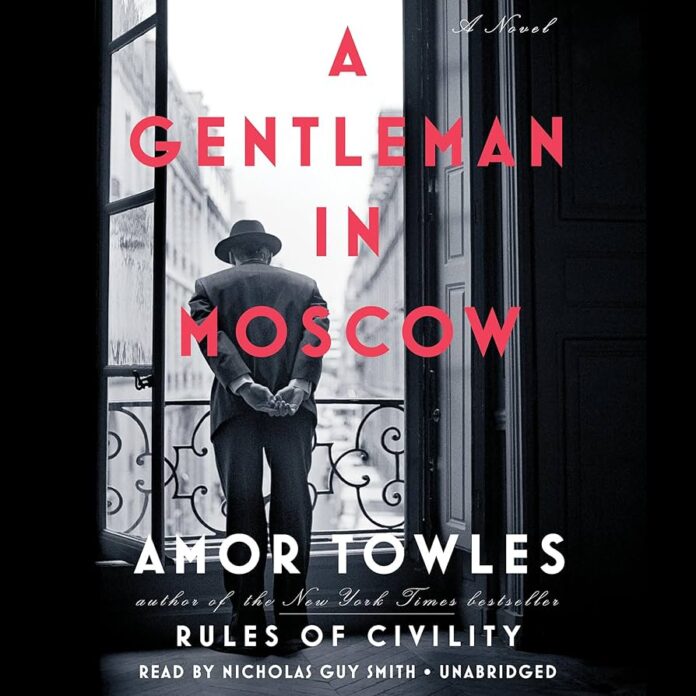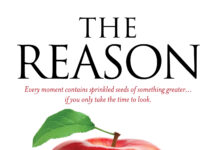Tucked away within the confines of a grand Moscow hotel, A Gentleman in Moscow invites readers into a world where time slows, and elegance endures behind imposing walls. In Living Elegance behind Walls: A Thoughtful Look at A Gentleman in Moscow, the narrative’s rich portrayal of resilience, refinement, and the quiet revolution of the human spirit is examined with careful attention. This review embarks on a reflective journey through the novel’s intricate layers, exploring how the story’s restrained setting becomes a canvas for broader themes of identity, history, and grace under pressure.
Living Elegance Explored Through Confinement and timeless Russian Culture in A Gentleman in Moscow

Within the walls of the Metropol Hotel, A Gentleman in Moscow delicately unveils how elegance transcends mere surroundings, becoming a matter of spirit and resilience. Count Alexander Rostov’s confinement is not a cage but a canvas where the refined art of living patiently flourishes. His world, bounded yet expansive, breathes Russian culture through timeless rituals like tea ceremonies, classic music, and literary gatherings. It’s in these moments that the novel explores how tradition and grace quietly resist the relentless tides of political change,offering readers a poignant reflection on finding beauty amidst constraint.
The novel brilliantly juxtaposes the external limitations with the richness of internal freedom, a theme echoed in the characters who surround Rostov. The table below illustrates key Russian cultural elements that permeate the narrative, acting as anchors of identity and sources of solace:
Best-Selling Books in This Category
| Cultural Element | Importance in the Story |
|---|---|
| Classical Music | Symbolizes enduring beauty and emotional expression |
| Russian Tea Ceremony | Represents hospitality and moments of connection |
| Literature and Poetry | Acts as refuge and intellectual resistance |
| High Society Rituals | Preserve dignity amid political disruption |
A Deep Dive into Character Development and Psychological Nuance Within the Hotel Metropol’s Walls

Within the opulent corridors of the Hotel Metropol, character development unfolds with the subtlety of a whispered secret. Each resident, from the enigmatic Count to the lively staff, is crafted with layers of psychological complexity that mirror the shifting tides of early 20th-century Russia. This setting serves as more than a backdrop; it is indeed a living entity that shapes and is shaped by its inhabitants, weaving a tapestry of human resilience, quiet desperation, and the enduring hope for dignity. Through meticulous portrayal, we witness how confinement paradoxically liberates internal worlds, allowing characters to explore identities and relationships that transcend physical limitations.
Key elements contributing to this psychological depth include:
- Internal Conflict: Characters grapple with their pasts, ideologies, and personal growth within restricted spaces.
- Interpersonal Dynamics: Relationships evolve with nuance, revealing trust, betrayal, and unexpected alliances.
- Symbolic Environments: The hotel itself acts as a microcosm, reflecting societal changes and emotional states.
| Character | Psychological Trait | Symbolic Representation |
|---|---|---|
| The Count | Resilience & adaptability | Grace under Constraint |
| Anna Urbanova | Passion & Mystery | fleeting Beauty |
| Emile | Loyalty & Humility | Steadfastness |
How Viktor’s Journey Reflects Resilience and Grace Amid Political Upheaval and Personal Limitations
In the heart of turmoil, Viktor’s story stands as a poignant testament to the human spirit’s ability to adapt and thrive against all odds. Confined within the stately yet confining walls of the Metropol Hotel, he does not surrender to despair or bitterness. Instead,Viktor embodies a quiet strength – a blend of grace under pressure and unwavering resilience that subtly defies the harsh forces outside. His journey illustrates that true resilience is not about loudly overcoming adversity but about the calm acceptance and thoughtful navigation of circumstances beyond one’s control. Through carefully cultivated relationships and moments of simple joys, Viktor paints a rich portrait of maintaining dignity and hope through societal upheaval and personal constraints.
- Adaptation: Viktor learns to find vast worlds within narrow walls,turning confinement into a stage for personal growth.
- Grace: His measured reactions and civility become forms of silent rebellion and profound strength.
- Connection: Building meaningful bonds within limited spaces reveals his deep understanding of human nature and resilience.
| Aspect | Expression in viktor’s Journey |
|---|---|
| Political Upheaval | Quiet defiance through adherence to personal values |
| Personal Limitations | Architect of a rich inner life despite physical confinement |
| Resilience | finding purpose and joy in everyday moments |
| Grace | Maintaining dignity through empathy and kindness |
The Symbolism of Elegance and Tradition in the Apartment’s Richly Described details and Daily Rituals
Within the walls of the Metropol Hotel, every item and custom unfolds a narrative steeped in grace and heritage. From the antique furnishings to the embroidered linens, each detail serves as a silent witness to a bygone era where refinement was a daily pursuit. The protagonist’s apartment, with its carefully curated artifacts and meticulously maintained atmosphere, symbolizes a sanctuary of order amidst the chaos of political upheaval. Here, tradition isn’t simply preserved-it is lived and breathed, a continuous thread connecting past and present.
- Morning rituals: The precise brewing of tea, a moment of stillness before the day unfolds
- Evening routines: The reading by lamplight, wrapped in the comforting embrace of familiar surroundings
- Gestures of refinement: The polished silverware, the worn leather-bound books that line the shelves
These layered customs are more than mere habits; they are a form of resistance against the erosion of identity. each ritual, whether grand or minute, anchors the protagonist in a legacy of dignity, expressing a quiet defiance through elegance. The apartment becomes a living museum where the beauty of tradition endures not as nostalgia but as a resilient state of being,inviting readers to reflect on the power of space and routine in constructing a life rich with meaning.
Exploring the Social Hierarchy and Intricate relationships That Shape the Story’s Intimate Setting
within the confines of the Metropol Hotel, the narrative unfolds into a microcosm of society, where every character inhabits a distinct rung on an invisible ladder. These layers, ranging from aristocrats to servants, form a complex lattice of influence and subtle power plays. the protagonist’s interactions deftly reveal how social status transcends mere titles,blossoming into a language understood through gestures,shared histories,and even silences.Relationships are thus not only personal but emblematic of the shifting tides in post-revolutionary Russia, where old nobility and nascent ideologies collide quietly behind the hotel’s grand facade.
The intimate setting acts as both a stage and a sieve, separating and connecting the lives that orbit around the protagonist. This delicate web can be summarized through the layers of interaction, as shown below:
| Social Layer | Characteristics | Typical interaction |
|---|---|---|
| Aristocracy | Elegance, restraint, lingering nostalgia | Quiet camaraderie, veiled dissent |
| Hotel Staff | Loyalty, service, observant | Discreet aid, insider information |
| Political Figures | Powerful, cautious, authoritative | Subtle pressure, guarded dialogue |
| Other Guests | Diverse, ephemeral, curious | Transient connections, opportunistic alliances |
These diverse threads weave a tapestry that is as much about survival as it is indeed about connection, embodying the paradox of isolation found within community. Each interaction subtly shifts the balance, reminding us that behind the hotel’s opulent walls, the intricacies of human relationships chart the true geography of the story’s world.
Narrative Techniques That Blend Historical context with Poignant Moments of quiet Reflection
A Gentleman in Moscow masterfully intertwines sweeping historical shifts with intimate, unspoken moments that invite quiet contemplation. The narrative often pauses on small, seemingly mundane details-a tea ceremony, a stroll through the hotel corridors, the delicate unfolding of a conversation-allowing readers to feel the weight of time pressing softly against the protagonist’s restrained existence. This technique establishes a rhythm where history pulses beneath every word and gesture, yet the story’s heartbeat remains profoundly personal. It’s through these tranquil interludes that the novel reveals the richness of inner life, as the character’s reflections subtly mirror the larger socio-political changes outside the hotel’s walls.
- Minimalistic dialogue: Conversations layered with meaning, often hinting at broader historical events without explicit exposition.
- Symbolic settings: The Metropol Hotel acts as both cage and sanctuary, a stage on which personal and political dramas quietly intersect.
- Internal monologue: Silences speak volumes,letting readers absorb the emotional complexity behind acts of restraint.
The narrative also employs structured contrasts, balancing the monumental scope of history with moments of serene personal insight. Below is a brief comparison illustrating how historical turbulence and quiet reflection coexist in the storytelling:
| Historical Context | Quiet Reflection |
|---|---|
| The aftermath of the Russian Revolution | A moment spent savoring a cup of tea |
| Societal upheaval and surveillance | Quiet contemplation of personal freedom within confinement |
| Shifts in political power | Reflecting on the meaning of honor and dignity |
Themes of Time, Memory, and Redemption Portrayed Through Viktor’s Life in Captivity with Poise
Viktor’s journey within the confines of the Metropol Hotel presents a delicate tapestry woven with the threads of time and memory. Each tick of the clock marks more than just passing hours-it chronicles moments of reflection, growth, and quiet defiance. Even though trapped by circumstance, Viktor channels his captivity into an elegant dance with the past, preserving his identity through rituals and recollections. His ability to cherish memories becomes an act of rebellion, transforming imprisonment into a canvas of poise rather than despair.
Throughout his confinement,Viktor’s path unfolds as a testament to the human spirit’s capacity for redemption. In the face of isolation, he cultivates relationships, cultivates grace, and rekindles purpose. This process mirrors a gentle reclamation of self, where each interaction and decision quietly chips away at the bars that hold him. The following list highlights key virtues Viktor embodies,elevating his experience beyond mere survival:
- resilience: Enduring hardship without surrendering to bitterness.
- Grace: Upholding dignity in even the simplest of moments.
- Reflection: Deeply engaging with memories to foster wisdom.
- connection: Finding meaning in bonds forged within confinement.
| Theme | Manifestation in viktor’s Life | Symbolic Element |
|---|---|---|
| Time | Daily routines marking the passage, yet not the limitation | Hotel clock tower |
| Memory | Preserving identity through stories and rituals | Family heirlooms |
| Redemption | transforming isolation into purposeful existence | Art and friendship |
The Role of Supporting Characters in Enhancing the Novel’s Emotional Depth and Social Commentary
in A Gentleman in Moscow, the supporting characters act as vital threads in the intricate tapestry of the narrative, enriching the emotional resonance of Count Rostov’s confined world. Characters like Nina, the precocious child with a zest for life, and Anna Urbanova, the charismatic actress, bring out different facets of the Count’s personality, creating layers of warmth, conflict, and tenderness that would or else remain dormant. Their interactions serve not only to illuminate his resilience but also to explore themes of friendship, loyalty, and the evolving nature of identity within the claustrophobic walls of the hotel. Each character’s subtle presence magnifies the emotional stakes,turning a story about limitation into a symphony of human connection.
Beyond personal dynamics, these figures also function as a prism through which the novel’s social commentary is refracted, reflecting the seismic shifts in Russian society across decades. From the loyal maids to the covert revolutionaries, their diverse backgrounds and motivations embody the tensions between tradition and change, privilege and survival. This dynamic is effectively illustrated in the table below, highlighting key supporting characters and the societal elements they represent:
| Character | Role | Social Theme |
|---|---|---|
| Nina kulikova | Child with wonder | innocence amidst turmoil |
| Anna Urbanova | Actress and confidante | Art and expression under censorship |
| Joseph | Head Waiter | Loyalty and tradition |
| Oryol | Secret police agent | Surveillance and control |
Aesthetic and Mood: How Atmosphere and Setting Create a Unique Sense of Elegance and Isolation
The novel masterfully weaves a tapestry of atmosphere that feels both luxurious and restrictive, capturing an essence of refined solitude. Spaces within the Metropol Hotel are more than just settings; they become characters themselves, evoking a dual sense of opulence and confinement. This juxtaposition creates a delicate balance where elegance thrives amid isolation, revealing how surroundings can shape not only mood but also personal transformation. Dimly lit corridors, plush interiors, and meticulous detail evoke a world that is at once timeless and suspended, inviting readers to linger in the quiet tension between freedom and imprisonment.
Through nuanced descriptions, the atmosphere orchestrates an emotional undercurrent that resonates deeply. Key elements that elevate the ambiance include:
- Lighting: Soft glows and shadows that craft intimacy within expansive walls.
- Sound: The subtle hum of the hotel’s pulse, from distant footsteps to the clink of fine china.
- Textures: Luxurious fabrics and aged wood that speak of history and quiet resilience.
- Spatial Design: Strategically confined spaces fostering both interaction and solitude.
| Atmospheric Component | Effect |
|---|---|
| Velvet Curtains | Envelop in warmth and secrecy |
| Grand staircase | Symbolizes passage of time and status |
| Marble Floors | Echo footsteps, amplifying loneliness |
| Clock Tower Chimes | Marks relentless progression, yet stillness |
Author’s Skill in Balancing Wit, Melancholy, and Philosophical Insight Throughout the Narrative
Amid the richly woven tapestry of A Gentleman in Moscow, the author masterfully intertwines elements of sharp wit, quiet melancholy, and profound philosophical reflection. The subtle humor serves not only to lighten the historically somber backdrop but also to reveal the protagonist’s resilient spirit. This is visible in the charming and often ironic banter that Escobar Merkel exchanges with the hotel staff and guests, a lightness that gracefully balances the weightier themes of confinement and loss. The narrative’s wit functions as a gentle reminder that even in adversity, human beings find solace in laughter and cleverness.
Together, the undercurrent of melancholy permeates the story like a soft, persistent echo – reflective, never overwhelming. Shadows of nostalgia and longing give depth to the Count’s quiet observations and his evolving relationships within the hotel’s walls. Interlaced within these emotional tones is a consistent thread of philosophical insight, prompting readers to ponder the nature of time, identity, and freedom. This harmonious blend elucidates complex truths through simple moments, such as a shared cup of tea or a stroll through a hotel corridor, inviting readers to engage with life’s paradoxes in a quietly meditative manner.
| Element | Role | Example |
|---|---|---|
| Wit | Lightens somber themes | Count’s clever dialogues |
| Melancholy | Evokes reflective depth | Memories of lost freedom |
| Philosophical Insight | Explores meaning behind confinement | Contemplations on time |
- Balancing humor with solemnity keeps the narrative engaging without diminishing its depth.
- Melancholy’s presence ensures emotional authenticity and connection.
- Philosophy invites ongoing reflection beyond the immediate story.
Why Readers Seeking Thoughtful, Character-Driven historical Fiction Will Find This Novel Compelling
At the heart of this novel lies a rich tapestry of characters whose inner lives unfold with mesmerizing subtlety. Readers drawn to stories where individual growth and intricate relationships take center stage will appreciate how every interaction, quiet moment, and personal challenge builds a vivid portrait of humanity confined yet never diminished by circumstance. The protagonist’s resilience and wit become a quietly rebellious force against the imposing walls that both imprison and protect him, offering readers a deeply personal journey through a historical era charged with political upheaval and social transformation.
What sets this story apart is its intentional pacing and attention to detail, inviting readers to savor each chapter like a carefully brewed cup of tea. The novel’s character-driven approach is supported by a delicate balance of historical context and intimate storytelling. Consider the following elements that elevate the reading experience:
- Multifaceted Characters: Each figure is flawed yet interesting,allowing readers to connect on an emotional level.
- Evocative setting: The confined hotel becomes a microcosm of a shifting society beyond its walls.
- Philosophical Undertones: Thought-provoking reflections on identity,purpose,and time.
| Character Trait | Symbolism | Narrative Role |
|---|---|---|
| Resilience | Unyielding oak tree | anchor of hope |
| Wit | Quiet lamp | Source of light & relief |
| Loneliness | Empty room | motivation for connection |
Lessons in Humanity,Dignity,and Adaptation Drawn From a Gentleman’s Life Behind Closed Doors
Within the confined elegance of a once-grand hotel,a life unfolds that teaches profound truths about the resilience of the human spirit. Through quiet acts of kindness and unshakable respect, we witness the embodiment of humanity in its purest form-where the barriers of circumstance dissolve in the warmth of compassion. This narrative reminds us that dignity is not a privilege reserved for the fortunate, but a practise cultivated through intention, patience, and grace. In embracing limitations, the protagonist redefines freedom, showing how the truest power lies in adapting without surrendering one’s core values.
- Empathy as a daily ritual: Simple gestures transforming isolation into connection.
- Grace under pressure: Maintaining poise amidst the unpredictable tides of fate.
- Adaptability: Redefining identity within the constraints of place and time.
| lesson | Illustration | Impact |
|---|---|---|
| Resilience | daily rituals despite confinement | Preserves mental freedom |
| Compassion | Small acts toward unlikely friends | Builds unexpected community |
| Dignity | Upholding manners and principles | Commands respect and inner peace |
Recommendations for Book Clubs and Readers Interested in Deep Character Studies and Russian history
For those captivated by the intricate dance of personality and circumstance, this novel offers an unparalleled exploration of resilience and grace.Readers are invited to wander the corridors of the Metropol Hotel, discovering not only the evolution of Count Rostov but also the subtleties of human dignity faced with confinement. Book clubs will find rich ground for discussion in the way characters are etched with meticulous care, each reflecting broader historical and philosophical currents. Themes of identity, loyalty, and adaptation spring to life, making it a profound vessel for examining how individuals navigate oppressive social regimes with quiet defiance and elegance.
Complementing the human narrative is the vivid tapestry of Russian history, rendered through a lens both intimate and expansive.The novel’s setting during tumultuous decades allows readers to track the transformation of an entire society through the count’s eyes. for groups eager to deepen their understanding of this era, pairing the book with supplementary materials such as historical timelines or short essays on post-revolutionary Moscow can enhance gratitude. Consider this comparative table as a starting point to frame your discussions, highlighting key historical milestones alongside their impact on the count’s personal journey:
| Year | Historical Event | Count Rostov’s Experience |
|---|---|---|
| 1922 | Count sentenced to house arrest | Loss of freedom; begins life at Metropol |
| 1930s | Stalin’s purges intensify | Quiet navigation through danger |
| 1941-45 | World War II impacts Moscow | Count’s relationships deepen amid strife |
- Engage with the subtle character development across decades
- Explore the societal shifts that frame personal evolution
- Delve into the philosophical reflections threaded throughout the narrative
- Complement your reading with historical context for enriched discussions
A Glimpse into Amor Towles: The Master Storyteller Behind This Elegantly Crafted Novel
Amor Towles masterfully blends historical detail with profound human insight, crafting narratives that linger long after the last page is turned.His prose is a harmonious balance of elegance and accessibility, inviting readers into meticulously constructed worlds where every character breathes with authenticity. What sets him apart is not merely his storytelling prowess but his ability to illuminate the quiet dignity of everyday moments,transforming the mundane into something extraordinary. Each sentence seems woven with care,echoing the restrained grace that defines his protagonist’s life within the walls of the Metropol Hotel.
Beyond his narrative art, Towles demonstrates a superb command of structure and pacing, seamlessly charting complex timelines and relationships with subtlety and precision. His works often explore themes of resilience, identity, and the passage of time, inviting readers to reflect on their own positions in the flow of history. Among his narrative techniques,three stand out distinctly:
- rich Characterization: Each individual is etched with layers of nuance and depth.
- Elegant settings: Locations serve as a character themselves, infused with cultural and emotional significance.
- Understated Wisdom: Wisdom unfolds naturally, without overt moralizing.
In the quiet corridors of A Gentleman in Moscow,where time folds delicately behind grand walls,readers find a narrative both rich and restrained-a tale of elegance lived not in opulence,but in the grace of endurance and subtle defiance. Living Elegance Behind Walls offers a thoughtful lens through which to appreciate this layered masterpiece, inviting us to ponder how confinement can forge a different kind of freedom. As the final pages turn, the story lingers-an elegant whisper reminding us that sometimes, the most profound journeys take place within the bounds of stillness and quiet resilience.












